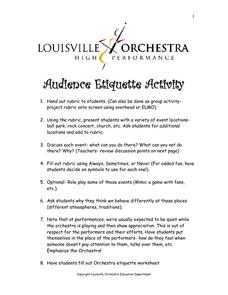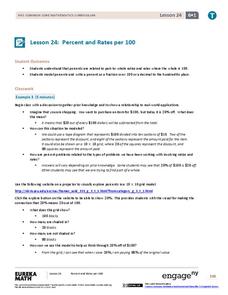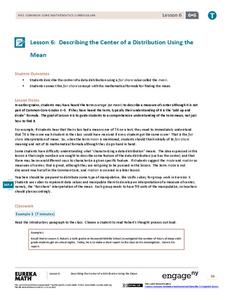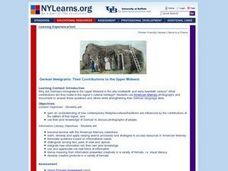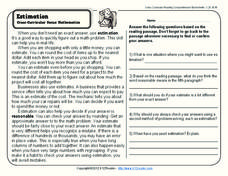EngageNY
Interpreting and Computing Division of a Fraction by a Fraction—More Models
Use a unit approach in developing a fraction division strategy. The teacher leads a discussion on division containing units, resulting in a connection between the units and like denominators. Pupils develop a rule in dividing fractions...
EngageNY
The Converse of the Pythagorean Theorem
Is it a right triangle or not? Introduce scholars to the converse of the Pythagorean Theorem with a lesson that also provides a proof by contradiction of the converse. Pupils use the converse to determine whether triangles with given...
Curated OER
Spider Safari
Today we are talking about one of the stealthiest, sneakiest, and most intriguing insects of all times, the spider. Learners will examine the predatory nature of these super bugs as they conduct a spider safari survey. Each child will...
Louisville Orchestra High Performance
Audience Etiquette Activity
Before you head to a performance, school pep rally, or sporting event with your class, be sure to review these worksheets and rubrics that discuss proper manners and etiquette at public events.
EduGAINs
Go H2O! Investigating Residential Water Systems
Before your learners excuse themselves to get a drink at the water fountain, prompt them to think about where that water comes from. A middle school science lesson encourages groups to research their community's source of drinking water,...
NOAA
Why Should I Care?: Show How Increased Carbon Dioxide Makes the Ocean More Acidic
How does a change in pH affect the ocean ecosystem? Scholars explore the idea by making an acid-base indicator in part seven of the 10-installment Discover Your Changing World series. First, they explore impacts of carbon dioxide in...
Teaching Tolerance
Community Puzzle Mural
Every piece of the puzzle is important. A lesson gives individuals the opportunity to create artwork that spreads a message of inclusion and tolerance. Class members work in teams to create pieces of the mural that form a larger picture....
Community Consolidated Schools District 168
Solar System Model Project
Challenge young astronomers to demonstrate their knowledge of the solar system with this fun open-ended science project. Provided with a short list of requirements, students are given the freedom to use their creativity and whatever...
Apache
Gerunds and Infinitives
Learning proper grammar rules for a middle school student can be difficult, especially in a texting world, but this resource demonstrates how the verb changes by adding a gerund or infinitive. Keep up the texting, but use this to...
Calvin Crest Outdoor School
Survival
Equip young campers with important survival knowledge with a set of engaging lessons. Teammates work together to complete three outdoor activities, which include building a shelter, starting a campfire, and finding directions in the...
EngageNY
Dividing by (x – a) and (x + a)
Patterns in math emerge from seemingly random places. Learners explore the patterns for factoring the sum and differences of perfect roots. Analyzing these patterns helps young mathematicians develop the polynomial identities.
EngageNY
Margin of Error When Estimating a Population Mean (part 1)
We know that sample data varies — it's time to quantify that variability! After calculating a sample mean, pupils calculate the margin of error. They repeat the process with a greater number of sample means and compare the results.
EngageNY
When Can We Reverse a Transformation? 2
The second lesson on finding inverse matrices asks class members to look for a pattern in the inverse matrix and test it to see if it works for all matrices. The teacher leads a discussion to refine the process in finding inverses, then...
EngageNY
Nature of Solutions of a System of Linear Equations
If at first you cannot graph, substitute. The lesson introduces the substitution method as a way to solve linear systems if the point of intersection is hard to determine from a graph. The 28th installment of a 33-part series finishes...
EngageNY
Percent and Rates per 100
What percentage of your class understands percents? Pupils learn the meaning of percents based upon rates per 100 in the 24th lesson in a series of 29. They represent percents as fractions, decimals, ratios, and models. The scholars...
EngageNY
Describing the Center of a Distribution Using the Mean
Everyone does their fair share. The sixth segment in a 22-part unit presents the mean as a fair share. Groups build a conceptual understanding of the mean of a data set, rather than simply learn an algorithm. Learners use the...
EngageNY
The Mean as a Balance Point
It's a balancing act! Pupils balance pennies on a ruler to create a physical representation of a dot plot. The scholars then find the distances of the data points from the balance point, the mean.
EngageNY
Creating a Dot Plot
Which dot am I? Pupils create dot plots to represent sample data through the use of frequency tables. The third segment in a series of 22 asks individuals to analyze the dot plots they created. The scholars translate back and forth...
Leadership Challenge
Helping Students See the "Gift" in Feedback
How can you help pupils view feedback as a blessing and not a curse? Lesson seven in a series of 12 character and leadership activities focuses on the S.A.R.A mindset and how to support budding leaders in their journeys toward the...
Curated OER
German Immigrants Contributions to the Upper Midwest
Learners explore contemporary lifestyles, cultures, traditions are influenced by the contributions of the German settlers of that region. They research these influences and design a brochure to entice potential immigrants to the Upper...
Curated OER
How Do You Like to Learn?
Use this worksheet to gather insight into the types of activities assignments that each of your students prefers, and create an effective, student-centered learning environment.
K12 Reader
Making Predictions
Read efficiently and effectively with a passage about making predictions and using headlines and visual aids as clues. After kids read a few paragraphs in the passage, they answer five comprehension questions on the side of the page.
K12 Reader
Estimation
When is it a good idea to use estimation? Learn about estimation and rounding with a reading comprehension lesson. After kids read a passage about estimation, they answer five comprehension questions on the other side of the page.
Curated OER
Claudette Colvin: Twice Toward Justice
Use the historical account of Claudette Colvin to study civil rights and connect past injustices to modern issues. As learners read, they examine chapter titles, record quotes, and participate in discussion. Next, they research active...
Other popular searches
- Great Expectations Quiz
- Dickens Great Expectations
- Great Expectations Unit
- Great Expectations Test
- Great Expectations Review
- Great Expectations Unit Test
- Great Expectations Unit Plan
- Dickens' Great Expectations
- Great Expectations Dickens"
- Great Expectations 44





